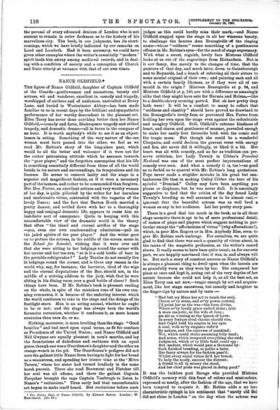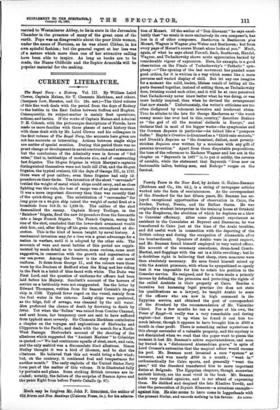NANCE OLDFIELD.*
THE figure of Nance Oldfield, daughter of Captain Oldfield of the Guards—gentlewoman and seamstress, beauty and actress, wit and wanderer, excellent in comedy and tragedy, worshipped of authors and of audiences, unrivalled at Drury Lane, and buried in Westminster Abbey—has been made familiar to us in recent days by the brilliant and sympathetic performance of her worthy descendant in the pleasant art. Ellen Terry has never done anything better than her Nance Oldfield,—comedy and farce, Shakespeare tragedy and stilted tragedy, and domestic drama—all in turns in the compass of an hour. It is worth anybody's while to see it as an object- lesson in acting. Something of the very nature of the one woman must have passed into the other, we feel as we read Mr. Robins's story of the long-since past, which would be all the better and welcomer if it were not for the rather patronising attitude which he assumes towards the "poor player," and the forgotten assumption that his life is something essentially different from those of all the world beside in its nature and surroundings, its temptations and its licenses. He seems to connect laxity and the stage in a superior and magnificent fashion, as if it were a necessary part of the laxness, and rather to be commended than forgiven. But Mrs. Porter, an excellent actress and very worthy woman of her day, is quite pilloried by the writer for her harmless and unobtrusive virtue, contrasted with the vagaries of the lovely Nance; and the fact that Barton Booth married a pretty dancer, and settled down with her to a thoroughly happy and conjugal domestic life, appears to cause him an indefinite sort of annoyance. Quite in keeping with this uncomfortable view of the dramatic world is the theory that often "the tinsel and eternal artifice of the stage —yea, even our own condescending admiration—pall on the jaded spirits of the poor player." And the writer goes on to picture the actress, in the middle of the screen scene in the School for Scandal, wishing that it were over and that she were sitting in her lodgings round the corner with her terrier and her tea-urn, "or is it a cold bottle of beer in the portable refrigerator ?" Lady Teazles do not usually live in lodgings round the corner, and is there any reason in the world why, say, for instance, the barrister, tired of the wigs and the eternal disputations of the Bar, should not, in the middle of a stirring address to the jury, wish that he were sitting in his dining room over a good bottle of claret ? Such things have been. If Mr. Robins's book is pleasant reading on the whole, in spite of the mistaken tone of his own run- ning comments, it is because of the enduring interest which the world continues to take in the stage and the doings of its footlight stars. Man is an acting animal, whether he ought to be or not; and the stage has always been the world's favourite recreation, whether it confesses it, as more honest countries than ours do, or no.
Nothing, moreover, is more levelling than the stage. "Good families" and bad meet upon equal terms, as fit for combats as Presidents of the United States ; and Nance Oldfield and Nell Gwynne are equally pleasant in men's months, and lay the foundations of dukedoms and earldoms with an equal grace, though one was a Guardsman's daughter and the other an orange-wench in the pit. The Guardsman's pedigree did not save the gallant little Nance from having to fight for her bread as a seamstress, and spending her leisure time at the 'Mitre Tavern,' where her sister had turned landlady in the same harsh pursuit. There she read Beaumont and Fletcher till her soul was all aflame, and there the gallant Captain Farquhar brought the sage Captain Vanbrugh to listen to Nance's "recitations." Thus early had that uncomfortable art begun to make itself heard. But recitations before such • The Palinu Days of None. Oidfield. By Edward Robins. London: W. Rein.lnann. L12/. 6d
judges as this could hardly miss their mark,—and Nance Oldfield stepped upon the stage in all her winsome beauty, to challenge the famous Ann Bracegirdle -of the ringing name—whose "coldness" seems something of a posthumous offence in Mr. Robins's eyes—for the meed of stage supremacy.
With what a sweet, roguish, lovely face Mistress Oldfield looks at us out of the engravings from Richardson. But is it our fancy, due merely to the changes of time, that the painters of that day, and much later, down to Gainsborough and to Reynolds, had a knack of referring all their sitters to some mental original of their own ; and painting each and all with a certain family likeness, as if they were all of one mould in the origin ? Mistress Bracegirdle at p. 84, and Mistress Oldfield at p. 140, are with a difference so amazingly alike that they might have sate for Hermia and Helena,—like to a double-cherry seeming parted. But oh how pretty they both were l It will be a comfort to many to reflect that "coldness and chastity" should have proved no drawback to the Bracegirdle's lovely face, or prevented Mrs. Porter from holding her own upon the stage even against the redoubtable and naughty Oldfield. Still, Oldfield's extreme kindness of heart, and charm and gentleness of manner, prevailed enough to make her easily first favourite both with the comic and the tragic muse. Bat though she could be a wonderful Cleopatra, and could declaim the gravest verse with energy
and fire, she never did it willingly, or liked it a bit. Her heart was all with comedy, and as far as tradition can pre- serve criticism, her Lady Townly in Cibber's Provoked Husband was one of the most perfect impersonations of
comedy ever seen. And what a comedy it is, too !—so good as to forbid us to quarrel with Mr. Robins's long quotations. Pope never made a stupider mistake in his great but can- tankerotts life than in making Colley Cibber the hero of his spiteful " Dunciad." Colley may have been anything you please or displease, but he was never dull. It is amusingly suggestive to find that the critics of the day found Lady
Townly's breeding so well assumed as to be almost real,— ignorant that the beautiful actress was as well bred a woman as any in her audience. Let her pretty story pass.
There is a good deal too much in the book, as in all these stage memoirs there is apt to be, of mere professional detail, of names of plays and players which suggest nothing in par- ticular except the "affectations of virtue" (why affectations?), which, in poor Mrs. Rogers or in Mrs. Anybody Else, seem to give Mr. Robins such umbrage. For ourselves, we are quite glad to find that there was such a quantity of virtue about, in the ranks of the magnetic profession, as the writer's record shows. It really seems to have been quite usual; as, for our own part, we are happily convinced that it was, is, and always will be. Bat such a story of constant success as Nance Oldfield's is always a pleasant thing to dwell upon when the laurels are so gracefully worn as they were by her. She conquered her place at once and kept it, acting out of the very depths of her nature because she could not help it, as all the best act, as Ellen Terry can act now,—tragic enough by art and acquire- ment, like her stage ancestress, but comedy and laughter to the finger-tips by nature and by taste :—
" Had but my Muse her art to touch the soul,
Charm Wry sense, and ev°ry power control, I'd paint her as she was—the form divine, Where ev'ry lovely grace united shine; (sic)
A mien majestic, as the wife of Jove ;
An air as winning as the Queen of Love : In every feature rival charms should rise, And Cupid hold his empire in her eyes.
A soul, with ev-'ry elegance refin'd By nature, and the converse of mankind : Wit, which could strike assuming folly dead ; And sense, which tempered everything she said; Judgment, which ev'ry little fault could spy :
But candour, which would pass a thousand by :
Such finished breeding, so polite a taste, Her fancy always for the fashion pass'd; Whilst every social virtue fir'd her breast, To help the needy, succour the distrest : A friend to all in misery she stood, And her chief pride was placed in doing good."
It was the luckless poet Savage who provided Mistress Oldfield's memory with this feast of colons and semi-colons, expressed so neatly, after the fashion of the age, that we have
been tempted to re-quote it. Mr. Robins adds a no less characteristic epitaph in his sentiment that "surely' old Sol did not shine in London" on the day when the actress was
carried to Westminster Abbey, to lie in state in the Jerusalem Chamber in the presence of many of the great ones of the earth. Pope was as disagreeable about the poor little woman, under the name of Narcissa, as he was about Cibber, in his own spiteful fashion ; but the general regret at her loss was of a nature which more than one of her attractive calling have been able to inspire. As long as books are to be made, the Nance Oldfields and the Sophie Arnoulds will be popular material for the making.



















































 Previous page
Previous page